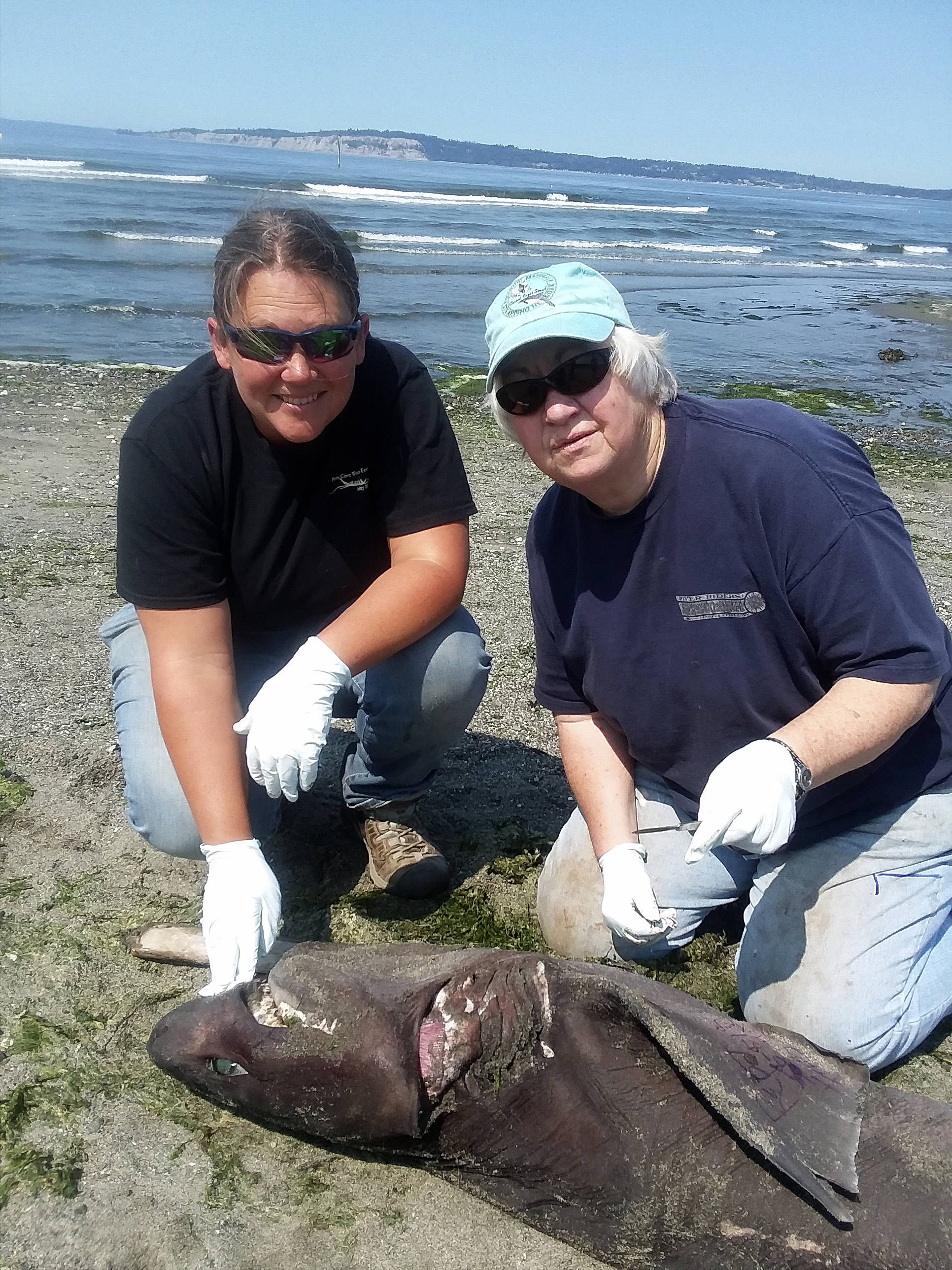A sixgill shark found dead on Maxwelton Beach earlier this week was young and did not appear to have any wounds or signs it was preyed upon.
“Investigators did not open the carcass,” said Sandy Dubpernell with the Central Puget Sound Marine Mammal Stranding Network. “It was an external exam only.”
Dubpernell coordinates sightings of stranded or dead marine mammals on Island County beaches.
“We were basically looking to see if there were visible signs of trauma. We did not see any,” said Kathy Fritts, one of two volunteers who examined the shark.
The shark, a juvenile, was 7 feet long and believed to be a female.
A necropsy, or animal autopsy, wasn’t done to determine cause of death because sharks washing up on Puget Sound beaches isn’t an uncommon occurrence, Dubpernell said.
“A dead shark is not unusual, just infrequent,” she explained. “I think we have responded to four (findings of) sixgill sharks in the past several years. One at Fort Casey State Park, one at Admirals Cove Beach Club and another at Lagoon Point.
“And now this one at Maxwelton.”
In the last decade, Seattle Aquarium researchers performed necropsies on several sixgill sharks that washed ashore regionally.
“Most of these sharks were found to have eaten the plastic mesh bait holder inside crab pots,” said Shawn Larson, curator of conservation research at Seattle Aquarium.
“We found it in their intestines. They are strong enough to bite through the metal crab pot to eat a crab or the bait.”
The sight of the seven-foot-long land shark on Maxwelton Beach both stumped and shocked Stina Wenzek of Clinton.
“I didn’t know what it was at first and then I got closer,” she said. “It was shocking because no one talks about sharks in the Puget Sound, only the ocean.”
She stumbled upon the carcass while taking a morning stroll Wednesday morning with her kids.
“I knew it was a rare site so we spent a long time admiring it.”
Sixgill sharks are among 11 shark species swimming in Puget Sound, and they are the largest.
“Most of the sixgill sharks seen here are not adults,” Larson said. “We think it’s a breeding nursery for them.”
Sixgill sharks, also known as a cow shark or mud shark, follow the curve of the bottom of the ocean, swimming from extreme depths to more shallow water to feed at night. They are predators and scavengers but humans aren’t on their menu.
“There’s never been a documented case of a sixgill shark attacking a human,” Larson said. “They’re a pretty docile and slow-moving shark.”
Washington state law bans fishing for them.
Seattle Aquarium researchers monitored sixgill sharks from 2002-07 when they were more prevalent in Puget Sound. Much of the information known about them came from lights, cameras and divers placed under Pier 59 in downtown Seattle.
A skin sample was taken from the Maxwelton shark to send to the Seattle Aquarium.
The species has six gill slits, unlike most other sharks which have only five. They are considered descendants of ancient animals as very similar sharks may have lived during the Jurassic era.
Sixgill sharks are known for their large marble-like fluorescent green eyes.
“The eye is amazing,” said Fritts, who examined the dead shark. “When the jaws are open the eye slides back in its socket. It’s almost invisible.”
Wenzek reported the shark to the Stranded Marine Mammal Network, which responds to many real and imagined creatures floating in on the tide.
“We responded to this carcass just to check out something of interest,” said Dubpernell. “A response is not required for a river otter, shark, coyote or floating cow, or even the hippopotamus that was reported.”
The land shark didn’t attract much attention until investigators arrived with measuring tape and other tools.
“Funny enough, as the beach got busier, no one saw it,” said Wenzek. “One guy almost tripped over it and still didn’t see it until I pointed it out right by his feet.”


